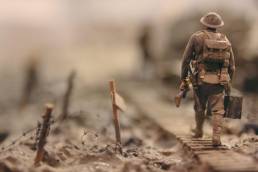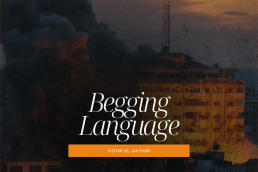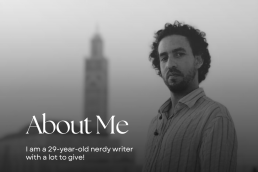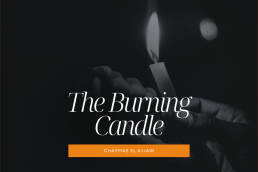The white cloth draped over my shoulders is the only thing that reminds me, in such moments of chaos, of the reason why I came here in the first place. Everything is blurry, turning my day-to-day life into an indistinct image. It’s been three months since I climbed the stairs to the plane with a beating heart and many dreams. I wanted to be a savior, a hero, and a perfect doctor. I longed to be someone who spends her time and energy making others feel less pain and despair. What a beautiful, selfless thing to do. Being a doctor is hard, but, little did I know, being a doctor when the war is at its peak is much harder. I embarked on this journey with great enthusiasm, only to have it crushed into a terrible chilling terror once the first dismembered body was laid before me. I would be lying if I said that I have gotten used to the cries of pained children and dying elders. The women who give birth in such tragic conditions do not get the chance to celebrate the birth of their newborns as they have to run back home to make sure none of their other children were killed.
I came here as a cardiologist and ended up doing everything, from extremely complicated surgeries to checking up on kids who cannot stop coughing from the smoke they have ceaselessly inhaled. Because they are desperate and out of options, the people here would let a random passerby sew their limbs back on without wondering whether they are medically qualified or not.
This feeling of despair; I know it too well. Waiting for the magical hands of a doctor to heal your loved ones, anticipating their return to your daily life, as healthy and warm as before, and hoping that everything is going to be okay. My grandpa was a man of authority with a strict presence both at home and work. He was a renowned politician, and his name alone was enough to bring the bravest men to their knees. Someone with this much power was deemed invincible, but fate had its own plans.
He fell ill unexpectedly. While we had enough money to get him into the best clinics in the country, that money could not buy us an early diagnosis. By the time doctors found the lung tumor that was eating him inside out, it was already too late.
When he passed away, a huge part of me crumbled forever. He was the father figure I never had and the anchor of a whole family that relied on him heavily. Seeing his feeble body laid on the white sheets of a hospital bed broke me in unexplainable ways. I promised myself that after I graduate from medical school I would be a doctor that works harder than everyone else, a doctor who makes sure her patients never die. And it’s impossible, I know, for death is an unexpected visitor, and it comes when you least expect it regardless of how good and dedicated you are. Yet, I wanted to try. And I am trying now. It’s not as fulfilling as I thought it would be.
It has been a month since the global spread of the new virus Covid-19, making it an emerging pandemic. Airports have closed their gates, and nearly every country in the world has retreated to its cocoon to protect itself from the deadly disease that collects human lives like the grim reaper. My husband has been updating me on the situation back home. Masks on faces, curfews as early as 6 pm, supermarkets closing their doors, and toilet paper wars in store aisles. It has been crazy, hectic, and apocalyptic. And while this is an understandable reaction to an unknown threat that has killed too many people in such a short span, I can’t help but find it quite ridiculous.
Here, squashed between the palms of a long, exhausting, and meaningless war, the last thing people are worried about is Covid-19. Dying from a respiratory illness sounds less frightening than being bombed to shreds or having your arm or leg – and in certain cases, both – amputated. There is no quarantine, no social distancing, and no online school. School itself is a privilege not accessible to many. In moments like these, I realize how different things are from one piece of land to another. While a microscopic particle is wreaking havoc everywhere, the people that got used to the atrocities of war chuckle bitterly at the name of it. What is Covid in the face of bullets and armored tanks?
Before coming here, I left my one-year-old son in the arms of my distressed husband. He did not want to stop me from the one thing I had been dying to do, but he had plenty of worries. I told him it would only be a few months before he sees me again. But now, I’m not sure if that’s true. Things don’t look bright on either side and traveling right now is impossible. I call him whenever there is a signal since both fighting parties apparently take down phone towers on a whim. He has a new thing to tell me every day. How my son grew his first premolar tooth, how he walked his first steps, how he threw a fit when his toy train suddenly stopped working. How he would gaze dreamily at the playground from the window after watching children on TV playing together. Kids his age are supposed to walk around, fall on the pavement, scrape their small knees, and have their mothers kiss their cuts better. They are supposed to meet their peers, talk to them – or at least try to, depending on how able they are to speak – and play in the sand with them.
What the quarantine has taken away from our children is irreplaceable. It’s months, if not years, of growth, memories, and new experiences that they won’t get to try. And while I am miles away from the person that needs me the most right now, I try my best to see him in the people that come by every day seeking my healing powers. They look at me, with expectant eyes, eyes that I can’t let down. They explain what hurts them, or their loved ones, and ask me if there’s hope, if they can get back to normal. I pat their heads and say that I’m going to do my best. And I do, but my best is not always enough.
No matter how many people die in front of me, or in my shaky hands, it will forever be excruciating and life-draining. It’s a human life, a person with memories, things they love and hate, and people that can’t bear living without them. You were entrusted with their life, but it slipped through your knuckles like flowing water.
My workday usually starts with someone knocking on my door, then several people rush inside the room before I get to open my eyes. An injured person is laid on the table by the time I leave the bed, and I have to be quick, efficient, and, more than anything, dedicated to saving them. It’s hectic, chaotic, and exhausting. A large number of people have contracted the virus ever since it reached this land. All of a sudden, it wasn’t something we can joke about or call insignificant when compared to the destruction the war has caused. Misfortunes never come individually; Covid-19, the bombings, and the soldiers with their huge guns shooting randomly at civilians. I had to find a way to stay safe and keep these people safe at the same time.
While I was busy doing my job, my son caught covid and was hospitalized. When my husband called to let me know, I felt like everything I had been doing was a mistake. I couldn’t even be by my baby’s side to make the two of us feel better. What if I lost him and didn’t even get to kiss him for the last time and hold him to my chest with all the love I have in me? What is my purpose in life if it isn’t to be a good mother to a child that I brought to life, so selfishly, and then abandoned?
Covid isn’t only an illness that weakens the body; it is also a barrier that separates loved ones and forces them to say their goodbyes through the shaky reception of a phone line or, if they were lucky enough, a video call. It has changed everything about social interactions and banned hugs and handshakes. All we could resort to is waving, with six feet of distance between our bodies and endless sadness in our hearts.
And all I could think of was; “when is this nightmare going to end?” “When are we going to embrace each other again with no fear or hesitation?”
Marwa Damaan
Afanine
مجلة أفانين: هي منصّة إلكترونيّة حرّة، وشاملة، ومتنوّعة، تديرها جمعيّة كتّاب الزيتون والمعهد اللغوي الأمريكي بالدار البيضاء، وتضع على عاتِقها أن تفتحَ نافذةً، للكتّاب والفنّانين في المغرب، نحو آفاق الإبداع. تنشر المجلة أعمالًا أدبية وفنية للكتاب والفنانين الشّباب بالمغرب، بالإضافة إلى مقابلات، وبروفيلات، وفرص، وصور فوتغرافية، وغير ذلك. تروم المجلة تسليط الضّوء على إبداعات الكتاب والفنانين الصّاعدين بالمغرب.





